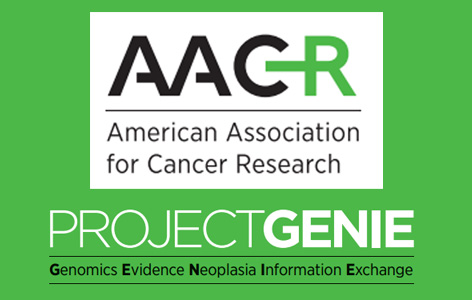Home page Description:
UHN researchers participate in an international project that aims to catalyze cancer research.
Posted On: January 05, 2017

Cancer genomic data generated by a group of researchers at the Princess Margaret Cancer Centre is set to be publicly released today as part of an international initiative that aims to accelerate clinical and translational research by supporting data sharing within the cancer research community.
The data is part of the American Association for Cancer Research (AACR) Genomics Evidence Neoplasia Information Exchange (link is external) (GENIE) project, which seeks to aggregate new and ongoing genomic and clinical information obtained from multiple research centres in the US, Canada and Europe. It is the largest publicly available cancer genomic dataset released to date with more than 19,000 de-identified datasets from 59 major cancer types, including breast, colorectal and lung cancers.
The genomic data is linked to clinical information but is fully de-identified—to comply with patient privacy laws—and can be utilized for numerous research applications, including: finding new signatures that will predict patient responses to drugs; identifying patients that will benefit from specific therapies; and uncovering novel drug targets and biomarkers that will enable personalized cancer care.
PM Cancer Centre researchers Drs. Philippe Bédard, Suzanne Kamel-Reid, Trevor Pugh and Lillian Siu as well as the Program Manager of the Cancer Genomics Program, Ms. Celeste Yu, played an integral part in collecting PM Cancer Centre’s data contributions to the project.
The data is part of the American Association for Cancer Research (AACR) Genomics Evidence Neoplasia Information Exchange (link is external) (GENIE) project, which seeks to aggregate new and ongoing genomic and clinical information obtained from multiple research centres in the US, Canada and Europe. It is the largest publicly available cancer genomic dataset released to date with more than 19,000 de-identified datasets from 59 major cancer types, including breast, colorectal and lung cancers.
The genomic data is linked to clinical information but is fully de-identified—to comply with patient privacy laws—and can be utilized for numerous research applications, including: finding new signatures that will predict patient responses to drugs; identifying patients that will benefit from specific therapies; and uncovering novel drug targets and biomarkers that will enable personalized cancer care.
PM Cancer Centre researchers Drs. Philippe Bédard, Suzanne Kamel-Reid, Trevor Pugh and Lillian Siu as well as the Program Manager of the Cancer Genomics Program, Ms. Celeste Yu, played an integral part in collecting PM Cancer Centre’s data contributions to the project.




